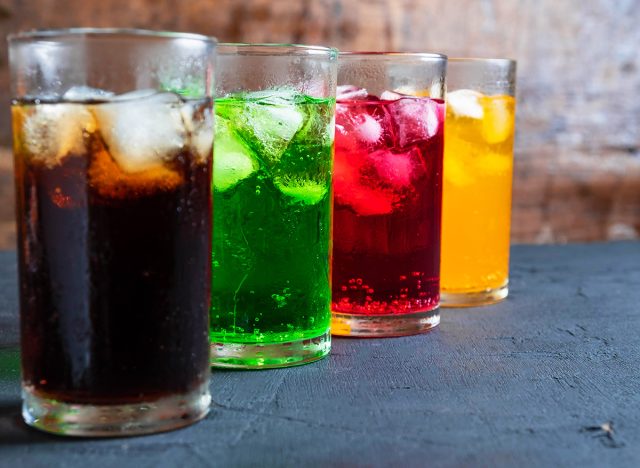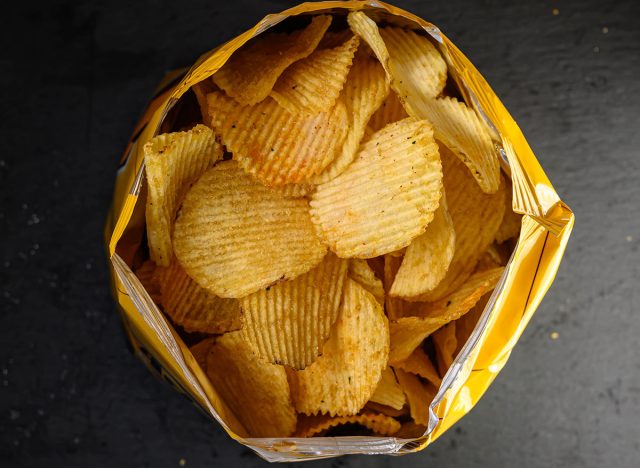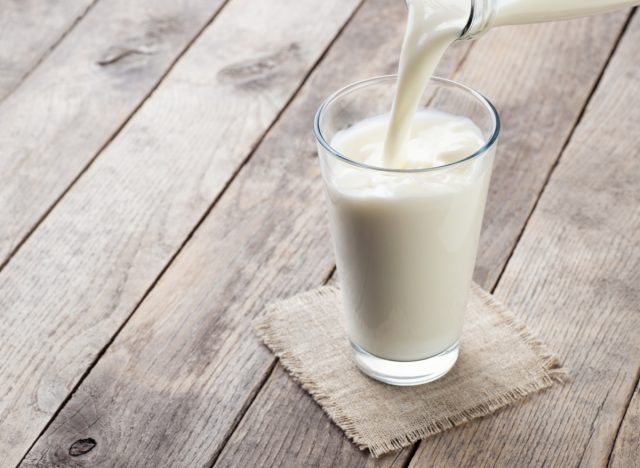6 Dangerous Ingredients That Still Haven’t Been Banned in the U.S.

When you shop for groceries, you probably don’t look at the long list of ingredients on the back. But you should! There are some food ingredients still allowed in the U.S. but banned in other countries. And they’re banned for a reason. Many of them lead to severe health issues.
Some companies have taken things into their own hands. Fast-food chains and soda companies listened to the research and petitions, and despite The United States Food and Drug Administration (FDA) not banning these ingredients, they phased them out anyway for the health and safety of consumers.
But if not banned, they’re bound to still be used in food in the U.S. Read on to find out what these dangerous ingredients are so you can avoid them.
Next, check out The Worst Foods That Have Been Linked to Cancer.
Azodicarbonamide

This chemical compound found in yoga mats can also be found in some cereal and bread. That’s right, the same ingredient that makes your dough soft and fluffy joins you in that Saturday morning yoga sesh. Although the FDA still approves the use of azodicarbonamide, it is banned as a food additive in Europe and Australia.
The World Health Organization reported that the chemical may cause asthma and other respiratory issues. And the FDA even noted that azodicarbonamide breaks down to form semicarbazide (SEM) during bread-making, which was shown to cause an increase of tumors in female mice. However, the FDA also adds: “These studies were conducted in rodents at levels of SEM that far exceed estimates of human exposure from the consumption of ADA-treated flour or bread products.”
After Subway announced they were removing the chemical from their bread in 2014, many fast-food chains followed. Yet, there are some products that still contain azodicarbonamide, such as Arby’s croissants, so be on the lookout for this ingredient.
Butylated hydroxyanisole (BHA)

While still allowed in the U.S., Butylated hydroxyanisole is banned from food in Australia, Europe, Canada, Japan, and New Zealand. According to the National Toxicology Program 14th Report on Carcinogens, the chemical is “reasonably anticipated to be a human carcinogen.”
Studies show that BHA can cause forestomach tumors in rats, mice, and hamsters, but there is currently not enough information on how it affects humans. BHA can be found in cereal, chips, instant mashed potatoes, nut mixes, and more, so look out for the ingredient on these packages.
Brominated Vegetable Oil (BVO)

Many soda companies like Coca-Cola and Pepsi have dropped Brominated Vegetable Oil from their list of ingredients, but it’s technically still allowed for use by the FDA (with some restrictions). Banned in food in Japan and Europe, cases of high consumption levels of BVO have led to skin hypersensitivity, headaches, fatigue, memory loss, and more.
Olestra

Linked to gastrointestinal disease, as reported by the Center For Science In The Public Interest, Olestra is banned in Canada and European countries. The FDA still allows Olestra as a food additive, so you can find it in some diet versions of chips and fries because it’s a calorie-free and fat-free chemical.
Synthetic hormones (rBGH)

You’ll find rBGH across the American dairy industry, despite the fact that it’s been banned in Canada and Europe. The Center for Food and Safety reported that rBGH causes health problems in cows and produces higher levels of the hormone IFG-1 in milk consumers.
Given that IFG-1 is linked to breast, prostate, and colon cancers, there’s reasonable concern that rBGH is not yet banned in the U.S. However, many dairy farmers have boycotted rBGH, so it will not appear in all dairy products.
Polyfluoroalkyl Substances (PFAS)

Found in food packaging, PFAS are still authorized by the FDA for wrappers, microwave popcorn bags, takeout containers, pet food bags, and more. However, several countries have called on the European Union to restrict and ban PFAS because they “have been documented as toxic and/or bioaccumulative substances, both with respect to human health as well as the environment,” as stated in a petition by Germany, Denmark, Netherlands, Norway, and Sweden.
In the United States, the city of Denver took matters into its own hands and banned PFAs from all food packaging. Although studies are ongoing, the National Cancer Institute has reported that PFAs may be associated with kidney cancer, prostate cancer, and several other types of cancer.
The FDA may not have banned PFAS yet, but fast-food chains like Wendy’s and McDonald’s announced that they were going to phase them out from packaging. Yet recent lawsuits against McDonald’s and Burger King show that they haven’t quite banned PFAS yet.









